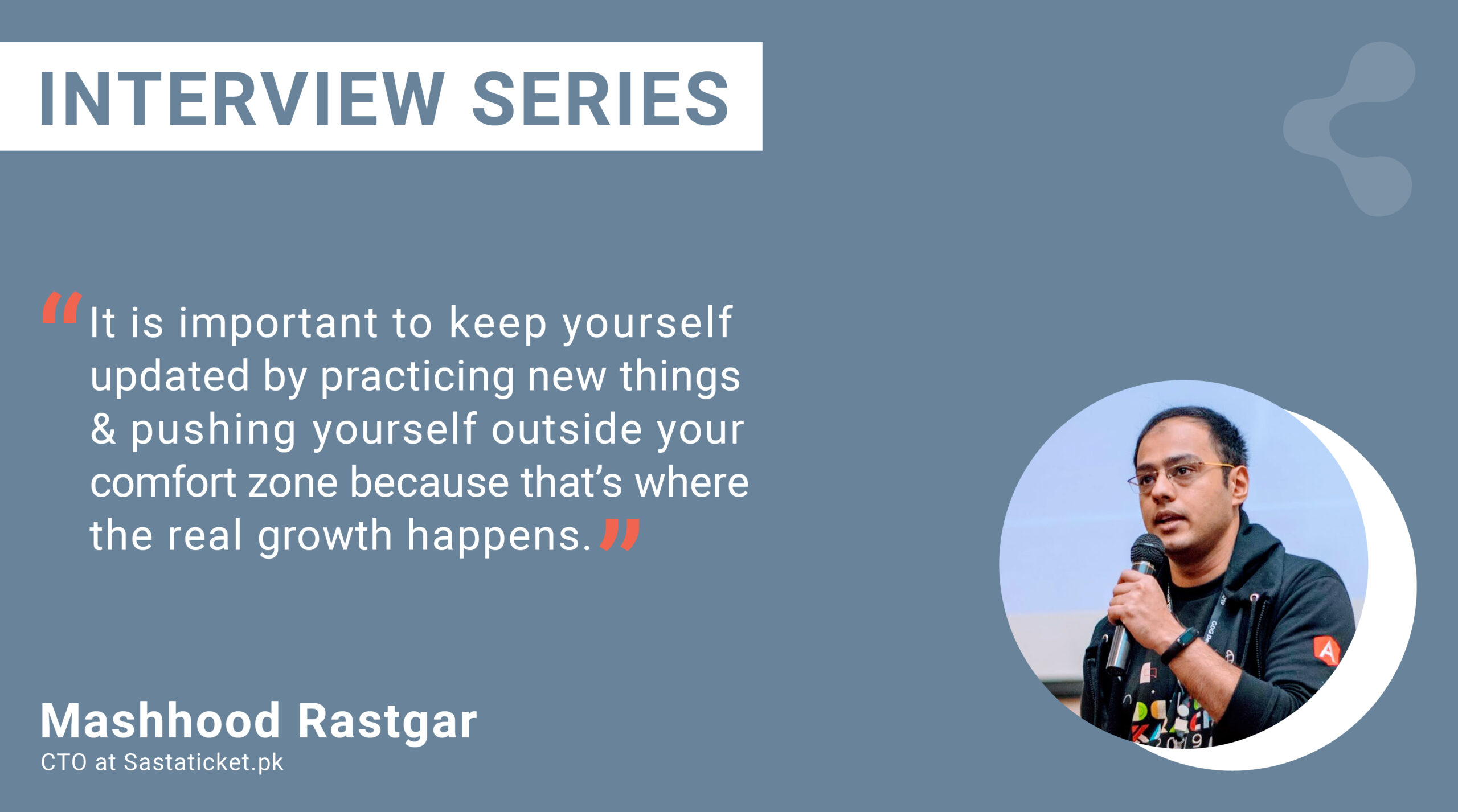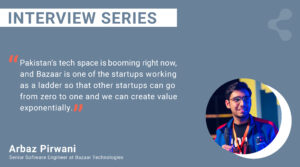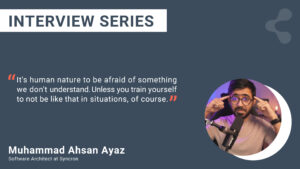“It is a really exciting time to be part of the Pakistani startup ecosystem. Loads of interesting challenges being solved, and sufficient capital has been deployed for the experimentation.”
– Mashhood
1. Hi Mashhood, it’s good to have you with us! It would be great to start by telling our readers about yourself.
Mashhood: Hello, I am Mashhood, currently working as a CTO at Sastaticket.pk. Previously I was running a software consultancy called Recurship which got bought by Sastaticket in 2018. I am primarily a web specialist and for the last 15+ years, I’ve been working on web applications of all sorts. I also have worked on mobile, desktop, and other kinds of applications but my main focus has generally been around the web elements.
2. We have recently seen you have engaged yourself in cycling. What was the motivation behind it?
Mashhood: Cycling is very interesting, and I’ve always been active in such activities. I believe that as a software engineer, I’ve been sitting on my computer for 8 – 10 hours a day so I need to take out 1 – 2 hours a day or 6 – 8 hours a week doing moderately intense exercises just to keep the body moving. Over the last decade, I’ve kept myself involved in some physical activities like swimming or going to the gym regularly. Before covid, I got reintroduced to cycling through a friend and as one thing led to another, we started taking things very seriously. Covid happened and everything shut down and the only exercises we could do alone were either walking on streets or doing something like cycling. In fact, many cycling groups came out pretty strong at that time which encouraged my interest and I ended up taking this as a hobby. I’ve been on a few adventures all around the city with my cycling groups. It’s a nice way to get yourself in shape and I feel fitter than I was before, because of this activity.
3. What challenges have you come across in your journey as the CTO at Sastaticket.pk?
Mashhood: My challenges kind of evolve over time as the startup changes and grows. When I started working at Sastaticket.pk, it was relatively a small company of just 25 people of which 12 were joined from my Recurship team. My responsibility at that time was across product design and engineering.
My challenge at that time was to juggle all the hats and make sure that we had enough work for the engineering team and if they are doing it properly. We didn’t have enough resources, so I had to ensure the quality. I had a lot of burden on my end, but over the last 3 years, we managed to scale up and today we have over 130+ people in the company and we are expecting a hit of 200 people next year.
The challenges, for now, are different as we have now not people but teams of people operating including engineering, product, and design. It is my job to enable each one of them and for that, I have to take a step back and look at the high-level view to see where the bottlenecks are and how can I reduce those bottlenecks. I also spend time building some internal analytics as well that gives us visibility on what are the things happening in the company across different teams. Basically, that’s what my primary work and the primary challenges revolve around.
4. As a CTO at Sastaticket.pk, tell us how your technology stack affects business costs?
Mashhood: There are two primary concerns here. Number one is the cost of running the software and number two is the cost of the developers writing the code and maintaining it over a period. From our running perspective, you can again see it from two points of view. One is assuming the best efficiency code that we are running, what resources are required by the code, and lastly how you write the code. If it’s a well-written code, it will take fewer resources.
When you’re developing code, you could probably write a very performant code using C, but it becomes expensive because the developers writing the code in C are very expensive, so that needs to balance out.
When we were starting off to build our stack, the two main contenders for us are JavaScript and python as they had the right kind of balance. They are efficient enough to scale and there are enough resources priced at the right standards to build the applications. This is the whole process of how technology is associated with business costs.
Also, when the software you are working on doesn’t work properly then that would also add a cost to the business. This is also where your business cost gets affected.
5. How Sastaticket.pk is different in providing services than other online travel agencies (OTA)?
Mashhood: Technically, there isn’t a lot of competition in the market in OTAs yet and that helps us automatically. But if you compare us with the international market and the companies like Expedia, MakeMyTrip, then one of the things that Sastaticket focuses on is being local. Those who travel internationally must have used Expedia and other international OTAs, these OTAs don’t let you make a local bank transfer, and you cannot use local debit cards on these websites. One big change is that we have dedicated call center support that most of the OTAs don’t do and in Pakistan people still don’t trust online, so, making them comfortable with the space where they can talk to someone is very important. So, we focus on localization and customer support as these are the core main differences.
6. Over the past two years, every business was affected, how was the Sastaticket product road map affected? What features were prioritized in that situation?
Mashhood: This was a very interesting journey for all of us. It starts off in March 2020 and we were moving ahead full steam to build on our pretty impressive growth targets for that year. We were going beyond those in the first 3 months but then Covid hit and suddenly everything shut down. It was like a matter of a week or just 10 days to make all the flights stop. It was not about having zero business, but we also had to refund all of the flights that got canceled. So that was an interesting challenge and I had two things in mind: one, we are going to survive this because we have enough money from our funding, and two, we need to start tracking and supporting our customers because this is happening and not going to be changing.
We started converging on all the problems that we had, around automating refunds and things like travel insurance that were released after covid and optimizing our finances so we could do better reporting on them. So, out of this, we got some very useful things to come out including our 24 hours refund policy where Sastaticket does the refunds within 24 hours no matter how many we have.
I must say that was a big change that we have achieved within the first 3 months after everything was shut down.
7. How much growth in business has Sastaticket.pk experienced till now since you joined and how do you predict the future growth of your company?
Mashhood: When I joined back in 2018, Sastaticket was taking tens of orders a day and what’s ahead of us is a long journey and at that time it looks very scary that how do we reach those larger numbers? As we’ve grown over the years, we are doing post covid thousands of orders a day. It’s pretty crazy and it will go on. Now every year Sastaticket grows 200 to 400 percent in the amount of business. For me, it’s pretty exciting to be here and see the growth, to see more and more people coming, using our website, getting that feedback, understanding what the choke points are and what are the things we need to improve and focus on, getting them out there and seeing people getting to know Sastaticket and starting using them.
8. Appforshare.io is a cloud-based platform that helps developers to upload the .apk or .ipa files for user acceptance testing for free. How do you find it useful for the developers?
Mashhood: Appforshare is an interesting website and I think one of the services it provides of allowing users to share their debug or production APKs/IPAs is part of critical tooling that is required for developers nowadays. There are many alternative products, so it would depend on what’s set up in your company and which tool you use. But as now we have one of the tools in this space, I think it looks very useful for those teams which have multiple apps. You have to be super responsive in terms of pushing specific builds out there and the QA team managing them.
You also need to make sure that you are going to hit that high-quality mark because a lot of the problems essentially that I see in this space are around code quality or product quality or around communication and a lot of the issues that go out are primarily around not getting the right build or build didn’t have the change that is needed.
I think Appforshare.io is a tool that will help you align better, and allow you to communicate better between teams and give you a better-quality product at the end of the day.
9. What advice do you want to give us to grow our platform in the future?
Mashhood: For future growth, I think doubling down on the product that you have. It’s going to be about understanding what other problems teams have in the space as I see the main value proposition is better communication between different teams. It means you must see what other challenges you have and what are the things on which you can work through in a better way.
Basically, there is a concept of problem discovery where you have to spend a lot more time with the teams of QA, development, and mobile, to see what other problems they have, where you can come in and give them a solution and make their lives easier. It could be managing the builds, either historic or new, release notes, and other problems. There are tools out there but it’s all about how you do it that could be the differentiating factor for the users.
10. Any tips for the developers and tech enthusiasts?
Mashhood: I think one of the biggest challenges that developers have nowadays is keeping in touch with what’s happening and how the tech industry is transitioning and not many people in Pakistan do that very well. So, the first thing I strongly encourage is to learn about the latest trends and updates in tech, and what you can do to improve yourself as a developer or a tech enthusiast. There are so many amazing resources available on YouTube, Facebook, Twitter, and many other platforms. I recommend following the tech leaders in the space.
There are so many amazing podcasts out there and that is something I also do. This way I end up learning something new and able to teach others as well. I built up this podcast which I named Karachi Wala Developer, a platform from where you can learn something about tech and startups.
There are many other mediums out there and it’s up to you to find the one that you can work with and learn from. But it’s important to keep yourself updated by practicing new things and pushing yourself outside your comfort zone because that’s where the real growth happens.
Thank you, Mashhood, for your valuable time and wonderful insights.
Appforshare.io provides you with a mobile-friendly platform that helps you in sending your files to your clients within minutes through OTA (Over the Air) deployment. Find the package and pricing details here.





